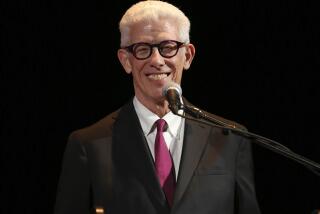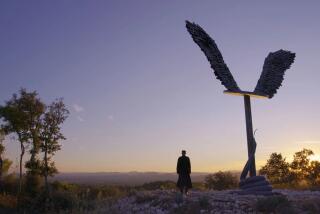Brecht Documentary Opens Three-Part Series at Goethe
- Share via
Over the next three Tuesdays at 7 p.m., the Goethe Institute, 5700 Wilshire Blvd.,will present “Landscape of Exile,” three documentaries by Christine Fischer-Defoy (some in collaboration with others) on World War II expatriate German artists.
The first, “Mein Name Is Bertolt Brecht--Exile in U.S.A.” (1988), is an informative account of the great German poet and playwright’s six years in Southern California. This period stretches from 1941 to Brecht’s appearance before the House Un-American Activities Committee in 1947, an appalling and pointless ordeal that led to his immediate departure from the country.
Fischer-Defoy is not an inspired documentarian, and she indulges in the maddening practice of rarely identifying the many people she interviews. But she’s such a conscientious researcher that viewers do get an idea of what Brecht was like and what he accomplished during his time here. Most important, they get the sense that America failed to live up to Brecht’s expectations.
Viewers also get the feeling that he was not particularly likable. He snobbishly dismissed the very nice Spanish-style bungalow where he first lived in Santa Monica, soon moving a short distance away to a fine old frame farmhouse still standing on 26th Street.
An elegant woman who befriended Brecht and his distinguished actress-wife, Helene Weigel, recalls her surprise when Weigel asked her to give shelter to Brecht’s mistress. This woman explains that Weigel was used to rationalizing away the many women in Brecht’s life by telling herself that “genius needs its inspirations.”
The high point of Brecht’s years here--and of the film--is his celebrated collaboration with Charles Laughton on a production of his play “Galileo” at the Coronet Theater, which is glimpsed tantalizingly in some silent footage that suggests how excitingly avant-garde it must have been.
Actress Frances Heflin, who appeared in the play, tells of the stimulating experience she had working with Brecht, who was strongly opposed to the Method, just coming into vogue at the time.
“Life’s Fine in the Labyrinth--George Grosz in America” (1991) screens May 20, and “Forbidden Sounds--Music Under the Swastika” screens May 27.
Admission is free.
Information: (213) 525-3388.
More to Read
The biggest entertainment stories
Get our big stories about Hollywood, film, television, music, arts, culture and more right in your inbox as soon as they publish.
You may occasionally receive promotional content from the Los Angeles Times.










